
Apr 24, 2019 | Apprenticeships, Leadership
On Monday, May 13, dozens of educators and industry leaders are expected at Business Roundtable: Apprenticeship as a Workforce Solution, hosted by Apprenticeship NH and NHTI, Concord’s Community College.
According to Amie L. Pariseau of the New Hampshire Lodging & Restaurant Association, the apprenticeship model is important in NH.
“Apprenticeships can assist employers who are struggling with workforce shortages by connecting them to students who are currently enrolled in Career & Technical Education or Community College programs,” she said. “Employees can also choose a current employee who shows potential that they want to foster growth in.”
Apprenticeship can also serve as a recruitment and retention tool.
“It’s a way for businesses to ensure they have a continuous pipeline of employees with the specific skills and training needed for the industry,” she added.
Al Lawrence, founder of Artisan Electric in Madbury, NH agrees and said the apprenticeship model also “does something a traditional education cannot do.”
“I’ll pay you to learn,” said Lawrence, who said he offers a paid four-year apprenticeship at his company.
His belief in and support of the apprenticeship model results from his appreciation for the outcomes it tends to generate within those who complete it.
“It is more than technical proficiency and skills — and, of course, that is important,” he said. “In the apprenticeship model, you are putting someone to work in the field to learn and experience it. In our program, we focus on developing skills like leadership, problem solving, communication and how to be a good team member.”
Such skills, said Lawrence, are generally lacking in today’s incoming workforce.
“Honestly, a lot of business owners like me are approached by people looking for a job, and the first thing they want to know is what is in it for them,” he said. “As an apprentice, I try to re-frame that and teach the person the skills we need them to have in this industry. They need to deliver value to the company.”
At Business Roundtable: Apprenticeship as a Workforce Solution, Pariseau said the goal of the event is to break down the structure of apprenticeship and discuss five key components: business involvement, structured on-the-job training, classroom instruction, rewards for skill gains and national credential.
“We hope to find employers to engage in the conversation about making apprenticeship part of their strategy to tackle their workforce challenges,” she said.
ApprenticeshipNH is a US DOL grant-funded program housed at the Community College System of NH that helps employers in high-demand industries build registered apprenticeship programs.
“They’ve been hosting roundtable discussions across the state in hospitality and other sectors as well, such as manufacturing and healthcare,” she said.
According to Lawrence, such discussions, while useful, just scratch the surface of a comprehensive solution.
“The larger question many of us face–whether it is the hospitality industry or the trades–is how do we attract young people?” he said. “How do we get kids excited about these industries, because many of us are struggling to handle the work we have now, and New Hampshire has a workforce that continues to age.”
To RSVP for Business Roundtable: Apprenticeship as a Workforce Solution, email apprenticeshipusanh@ccsnh.edu, or call 603.230.3526.

Apr 16, 2019 | Impact, Students
Students on the right “career path” in CTE
While Career and Technical Education (CTE) has garnered more attention in recent years, much is still misunderstood about it.
“CTE is not a lower level of education,” said Samara Holmes, current student at Seacoast School of Technology (SST). “Technical schools and entering ‘the trades’ have a bad reputation that shouldn’t be looked down upon.”
According to Holmes, SST has provided her and other students with the ability to earn college credit, and practice the real world application of learned skills.
“These are opportunities that wouldn’t be given to any other regular high schooler,” she added.
Fellow SST student McKayla Hartman agrees and cited several examples, one of which includes taking the Autodesk Inventor Certification Test in May, which she said will give her “a head-start to achieving [her] career goals.”
A current sophomore at Newmarket High School and in her second year of SST’s Pre-Engineering program, Hartman already has her sights set high. For her, the sky may not even be the limit.
“My main interest is exploring a career as a flight engineer and eventually working for NASA in the aerospace department,” she said. “I hope to maybe even become an astronaut and explore extraterrestrial life on other planets.”
She cited her enrollment in SST’s Pre-Engineering program as an important step toward that goal.
“I have been able to explore multiple engineering disciplines and discover my love and dedication to aerospace engineering,” she said. “I have been introduced to people who have similar aspirations as me, which have, in turn, allowed me to form many wonderful friendships, too.”
Holmes, a junior at Exeter High School who is currently in SST’s Computer Science program after finishing the Pre-Engineering course last year, cited a similar experience.
“SST helped me discover what career path I should follow,” she said.
Noting she has always been interested in “computing and creating,” Holmes acknowledged she was not sure if such interests could necessarily translate into a career.
“When I entered the engineering program freshman year, I was able to learn more about the types of engineering fields I could enter,” she said. “It helped me narrow down what I wanted to do.”
Hartman and Holmes not only share similar interests, they had the chance to work together this year on a project that garnered several accolades.
At the New Hampshire Science and Engineering Exposition on March 21, the students earned the Yale Science and Engineering Award and a $2,000 scholarship each to the New Hampshire Academy of Science.
For their teacher Vaso Partinoudi, the recognition was well-deserved given that the project focused on 4D printing and the fourth dimension, which refers to transformation over time or through a change in conditions.
“As soon as I looked at the poster Samara and McKayla created for this project, I knew they were going to place [at the exposition] – it was college level,” she said. “No one has heard of 4D printing, which is also how I knew they’d place. The judges were looking for the unexpected.”
As for the specifics, the project entailed submerging a 3D printed object into hot water to see if it would transform into another shape without human intervention. Hartman and Holmes also looked at how layering different materials on top of one other would be affected by the hot water.
The method for altering these structures can have real-world applications in the fields of engineering, robotics, medical, aerospace and others.
“We’re proud of the work we did,” Hartman said. “When we learned we got the special award from Yale, we started jumping up and down.”
“It’s pretty cool because we didn’t really expect that we’d win,” added Holmes.
On March 30, Holmes and Hartman secured additional recognition, as they both received awards in the Aspirations in Computing ceremony from the National Center for Women in Technology.
Expressing excitement at the recognition both students have received in recent weeks, Partinoudi said the real takeaway is how CTE helps inspire students to broaden their horizons.
“Winning the awards was the icing on the cake,” she said.
Accolades aside, Holmes said she is excited for her future and said her ability to direct herself is a skill she directly attributes to her CTE experience.
“Being able to know what you need to do, what you want to do, and combining those to achieve those goals is a skill that I will use in any aspect of my life,” she said. “High school has definitely been where I have achieved most of my goals because of self direction. I would not be as independent and prepared for life as I am right now without SST.”
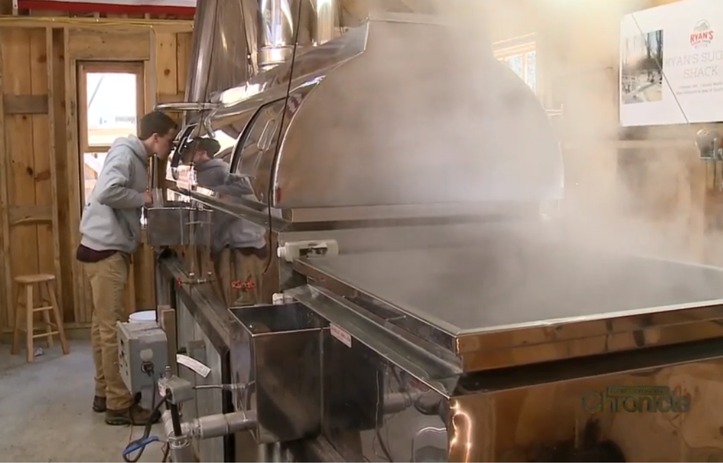
Apr 6, 2019 | Article, Centers, FFA, Natural Resources/Conservation
Pinkerton Academy senior Ryan Neil takes work-based learning to new heights. Starting at age 13, Ryan’s Sugar Shack got its start by tapping two trees. Five years later, he now has 1,500 taps which produced 250 gallons of maple syrup. This year, with the addition of a vacuum system, he is on track to produce 400 to 500 gallons of syrup. Pinkerton has its own sugar house which is part of their Natural Resources CTE program. Learn more from this segment which recently aired on WMUR’s Chronicle.
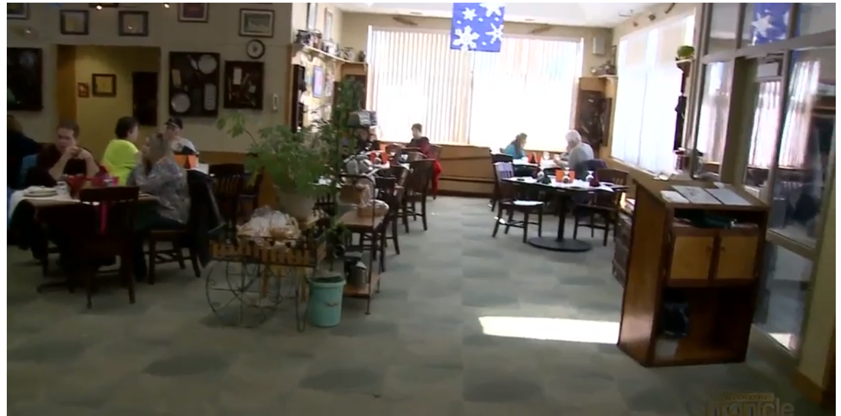
Apr 6, 2019 | Article, Culinary Arts, Hospitality, Programs
On a segment about out of the way lunch spots in New Hampshire, the Chronicle camera crew visited Windows on West Street, the culinary arts restaurant at Milford High School. Comments ranged from acquiring career experience while in high school to great food at a great price. Watch the segment here.

Apr 6, 2019 | Article, CTE Administration, CTE Promotion
Steve Rothenberg, CTE Director at Concord High School, recently shared his thoughts on changes which need to be made in our education system. “If we want more students to graduate truly ready for today’s college and career opportunities, we can no longer continue to educate them in silos that fail to connect that learning in meaningful and purposeful ways to careers.” Read the full article here.

Mar 4, 2019 | Challenges and Opportunities, Industry
Like many states around the nation, New Hampshire is experiencing difficulty filling available jobs in what are broadly referred to as ‘the trades,’ a problem managers and business owners fear will only worsen.
“This isn’t a case where we are going to be in trouble–we are already in trouble,” said Al Lawrence, owner of Artisan Electrical Contractors in Madbury, NH. “The average age of an electrician is over 55 in New Hampshire and the average age of a plumber is older. We take these trades for granted.”
Josh Brunk, executive director of SkillsUSA New Hampshire, agrees and said this ‘skills gap’ requires ‘hands-on solutions.’
“SkillsUSA New Hampshire, while not the only organization committed to filling this skills gap, plays an important role in helping students walk out of high school prepared for work in the trades,” he said.
One of the ways in which SkillsUSA New Hampshire works, according to Lawrence, who serves as its treasurer, is through local, state and national competitions in which students demonstrate occupational and leadership skills. At the annual national-level SkillsUSA Championships, nearly 6,000 students compete in 99 occupational and leadership skill areas.
“SkillsUSA programs also help to establish industry standards for job skill training and promote community service,” he added.
At the state level, the month of March is busy for SkillsUSA New Hampshire state staff like Lawrence, who expressed enthusiasm at the upcoming Electrical Construction Wiring contest. Scheduled to take place on March 20 at Manchester Community College, the contest includes a written test of questions formulated from the latest edition of the National Electric Code (NEC) and a practical conduit bending exercise.
“There is also a hands-on component where students must install a conduit system, cabling system and wiring devices,” said Lawrence. “It is not an easy competition.”
Sponsored by Electrical Contractors Business Association, the competition is supported by many of its members and other industry leaders, each of whom donated their time and resources, while Independent Electrical Supply supplies all materials. Competitors receive prizes of tools and scholarships and the opportunity to travel to Louisville, Kentucky and represent the state of NH in the national competition.

Al Lawrence of Artisan Electrical Contractors
For Lawrence, the state competition, however, is more than a fun experience, as he said it reflects the apprenticeship model of learning.
“In my model of learning, you come to work for me,” he said. “You don’t really have enough experience to know exactly what you want to do and you don’t have any significant skills yet, but I can teach those.”
He said the apprenticeship model of learning is “sort of like going to college” with one big difference.
“I’ll pay you to learn–not the other way around,” he said. “I am very comfortable with investing in the right type of person, because I believe that once they learn these skills that my investment will pay off.”
He said the current secondary educational system, however, defines higher education and what a professional career looks like In a very particular way. SkillsUSA and Career and Technical Education in general, he noted, are important because they reverse some of the stigmas that have been created regarding the trades.
“We have basically developed an unfair and inaccurate view of these professions,” he said. “We have created this horrible situation and just now are starting to figure out that we have a real problem.”
This problem, he said, has yet to be felt by many in society, although he said this will change in just the next few years.
“We need people with specific skill sets to do this work and the problem is we don’t have that,” he said. “They are all retiring and no one is taking over.”
While acknowledging there are some who may always laugh at the trades, Brunk said the kinds of careers possible today in them–and their pay–is no laughing matter.
“There are young people entering the workforce stepping into $25/hr. jobs and working their way up from there in careers that help build skills that transfer into other industries, too,” he said. “You can live a very comfortable life working in the trades.”
When the trades prosper, added Lawrence, the impact extends far beyond the individual lives of those who work within them.
“We are able to contribute to their local economy and raise families and give back,” he said. When we hire new people, it isn’t just the business that is getting direct benefit of that. Our employees have to go outside and buy lunch so they go to the local sub shop, they need gas, an auto mechanic, etcetera. “We are part of society’s infrastructure–we literally help build it.”
To learn more about SkillsUSA New Hampshire, visit skillsusanh.org.
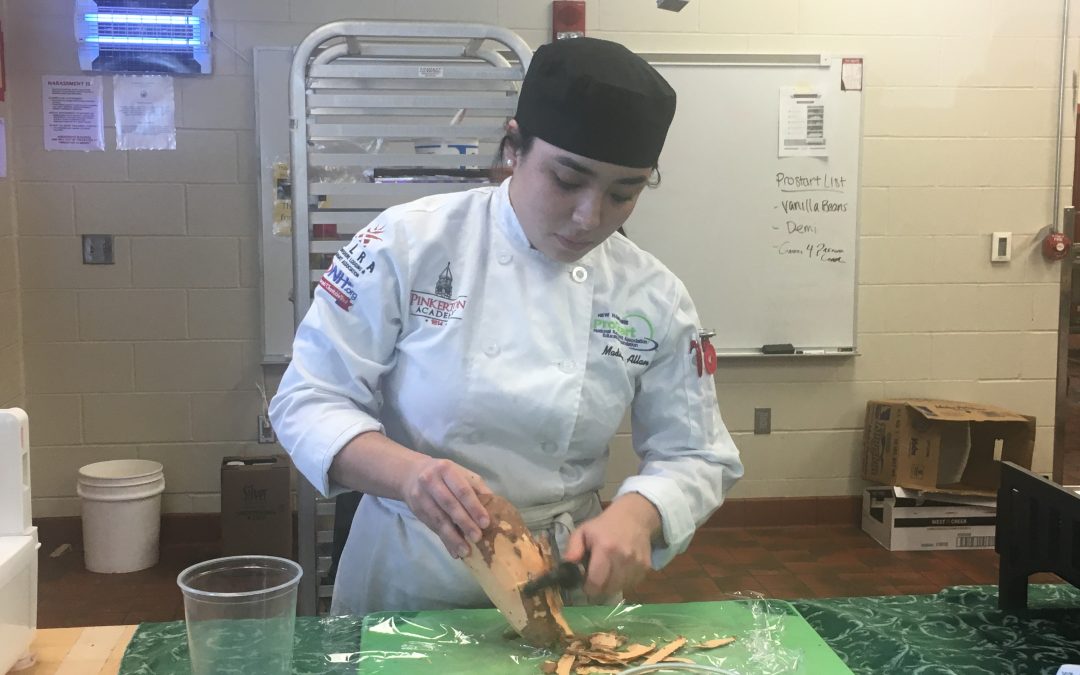
Feb 25, 2019 | Article
On Monday, March 11, students from more than half a dozen Career and Technical Education (CTE) Centers will compete in the NH ProStart State Invitational at the Executive Court Banquet Facility in Manchester.
During the culinary portion of the competition, participating teams demonstrate their creative abilities through the preparation of a three-course meal in 60 minutes with just two butane burners and no access to running water or electricity.
Madison Allan, a senior at Pinkerton Academy who competed at last year’s event and will be there this year, too, described the experience as “pretty tense.”
“Seeing the other competitors can be unnerving, but you want to feel confident going in,” she said. “Going first or last is also a little scary because all the judges are focusing on you.”
During the restaurant management competition, students will design their own restaurant in ProStartville and present to a group of judges their concept, menu and costing, marketing, critical thinking and operations.
For Allan and her teammates, the pressure is especially heavy, as Pinkerton Academy has won the competition two years running.
“Everyone is looking at you to fail, but I feel we are prepared to go in to defend our title for the third year in a row,” she said.
For Allan, the competition and the ProStart program itself is more than a great experience; rather, it is a springboard for her future. After graduation, she hopes to attend UMass Amherst for Hospitality and Tourism management. She also plans to work in a restaurant or hotel during school to learn more about the industry.
“ProStart has taught me a lot of skills like handling tasks under pressure,” she said. “Personally, I do better under pressure, and I feel that’s very important to have in this industry because you’re dealing with people daily. This can help me excel in whatever job I have in the future. It’s actually helped me at my current job many times.”
Amie Pariseau of the New Hampshire Lodging & Restaurant Association said Allan’s experience is representative of what takes place in ProStart.
“ProStart’s industry-driven curriculum provides real-world educational opportunities and builds practical skills and a foundation that will last a lifetime,” she said. “By bringing together the industry and the classroom, ProStart gives students a platform to discover new interests and talents to open doors for fulfilling careers.”
The annual statewide competitions as well as ones at the national level, she said, help set “a high standard of excellence for students and the industry.”
“Students who have completed the requirements of the ProStart program are awarded an industry-recognized certificate,” she added. “To earn the certificate, students pass two national exams, demonstrate a mastery of foundational skills and work 400 mentored hours.”
Aside from technical skills, Allan cited a more practical outcome from the program.
“The best part of being part of Prostart is obviously learning and utilizing different skills, like efficiency and organization, but most importantly making friends,” she said. “I met a lot of great people the last two years and still keep in touch with some of them.”
As for her thoughts on the competition in March, Allan said she is confident, but did admit some nerves, too.
“I would be lying if I didn’t say I still feel pretty nervous,” she said. “Anything could happen that you can’t plan for and that’s the scary part. Hopefully at the end, we put up some awesome plates that amazes the judges.”

Feb 20, 2019 | Article
According to Salem CTE Center Chris Dodge, one consistent challenge to enrollment in their programs, which range from Automotive Technology and Culinary Arts to Digital Graphic Applications and Marketing and Sales, stem from public misconceptions.
“There are many people in the general public that refer to what we do as vocational training,” he noted. “That is not what we do at all.”
Noting their programs lead to industry certifications, college credit, post-secondary placement and employment, he said the emphasis of Salem CTE Center–and any similar center across the state–is on college and career readiness.
“We are creating pathways to meaningful careers and sparking students’ interests through experiential, hands-on learning,” he added. “CTE programs are rigorous and can help launch a student’s career.”
Rhonda Haley agrees with Dodge and said her daughter’s experience at Salem CTE Center was invaluable.
“It gave her hands on learning and expertise that she would not have otherwise received at Windham High School,” she said.
Upon completing Culinary Arts at Salem CTE Center, Haley’s daughter Cassie went on “to flourish” at at Culinary Institute of America (CIA) in Hyde Park, NY. Cassie is now a front of house MIT (manager in training) for Compass Group, the largest restaurant management group in the United States.
“Both Chef Stuart, before his departure, and Chef Bratz gave Cassie insight not only into the work force, but into expanding her education past high school,” Haley said. “They were able to share their knowledge and visions, which helped Cassie in the decision making process for her own success…Cassie owes so much to the CTE program.”
Cassie agrees with her mom.
“The culinary program [at Salem CTE Center] had similar teachings that my first class at the CIA also provided me,” she said. “This allowed me to be a step above my fellow classmates that did not have a similar class in high school.”
Cassie received her Associates Degree in Culinary Arts in the spring of 2017. She was then accepted into the Bachelors program for Culinary Science and graduated December 2018.
“Cassie shares her alumni status with some of the greatest chefs in the world, including celebrity chefs Anthony Bourdain, Cat Cora, Michael Symon and Todd English,” added Rhonda.
For those still on the fence about CTE programs, Rhonda said she hopes her daughter’s experience helps illustrate what is actually taking place with NH’s CTE centers.
“For Cassie, [CTE] was the foundation for her college education,” she said. “It gave Cassie real life experience while learning and growing. Cassie found herself in that program–she grew and flourished into an amazing Chef.”
For any parent who wants to provide their children with every avenue to learn–whether it is engineering, business, or culinary, Rhonda said CTE programs “open those doors.”
“It gives them hands-on learning and education that can’t be taught straight from a book,” she said. “Giving students every opportunity to learn and spread their wings is what CTE is about.”
Cassie agrees and added, “CTE is not just an industry program that allows students to gain a certificate and bypass college. It opens up different possibilities that a normal high school wouldn’t give you.”
To learn more about Salem CTE Center, visit salemcte.com.
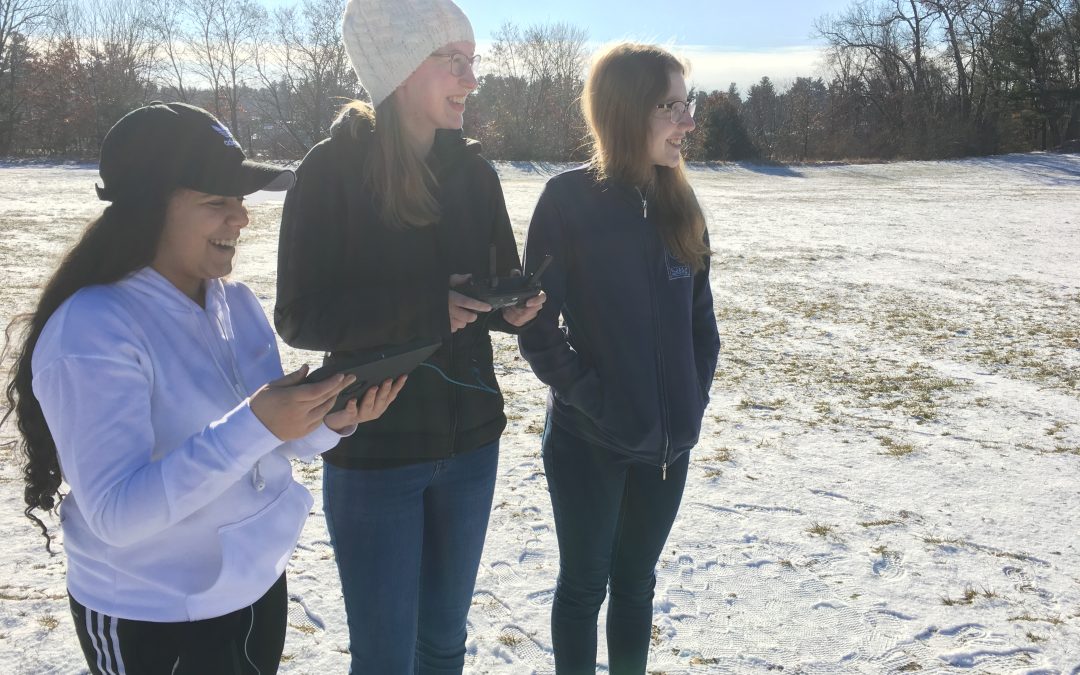
Feb 1, 2019 | Article
What started as a conversation in November 2017 among several staff has turned into Drones & Technology, a full semester class that will launch for the 2019/20 academic school year at Nashua Technology Center North (NTC).
Geared toward students in the 11th and 12 grade, the program will build off Drone Photography- Girls in STEM, a pilot class that successfully concluded this past November.
Photography teacher Erin Knoetig, who led the pilot and will run the program, said their initial focus on girls reflects inequity in the world of STEAM (Science, Technology, Engineering, Art and Math).
“We know from research that STEAM fields make up the fastest growing occupations today–and studies show that a majority of these fields a segregated by race, gender and income,” she said. “NTC is trying to remove those barriers by creating alternative pathways into these fields.”
Her choice of drones reflects their broad use in industry today.
“I want the kids to get a taste of the occupations you can have with drones,” said Knoetig. “Mapping, surveying, photography, FEMA, real estate marketing, infrastructure inspection, construction inspection, insurance, filming and photography, DOT, building, drone maintenance–the list goes on and on.”
In regards to learning outcomes from the pilot, Knoetig cited several.
“The girls are learning about computational thinking, collaboration, compositional photography elements and growth mind set,” she said. “They are also learning about leading ladies in STEM fields, gender and ethical inequality–these are all very important, relevant concepts.”
In discussing the logistics behind developing the pilot and program, Knoetig said she first had to secure her drone license, which she described as “a scary, yet confidence building experience.” The first step in attaining the license, she explained, was attendance at a Dart Drones class in New York last April.
“I was taught the basics of what I needed to know to pass the test,” she said. “This was no easy task. It took reading maps, flight patterns, math calculations, air spaces, radio calls, airport map information. There was a lot that had to be covered. The test prep questions were not the ones guaranteed to be on the test, but the concepts were…so it was a lot.”
With student feedback overwhelmingly positive from the pilot, which ran during eblock and concluded in January, Knoetig said it will run two more times throughout this school year before Drones & technology begins in September. She said that the best part about her experience so far has been the fact that she has learned as much from the students as they have from her.
“Watching them this past quarter and all they retained from 30 minutes a week has been amazing,” she said. “They have come to class prepared to teach the class about strong women in STEAM fields, I have seen them grow, watched them fail, and it has all been an amazing experience…It was a great environment to teach in.”
To learn more about the program, view Knoetig’s podcast at https://thedronetrainer.com/drone-podcast-58-erin-knoetig.
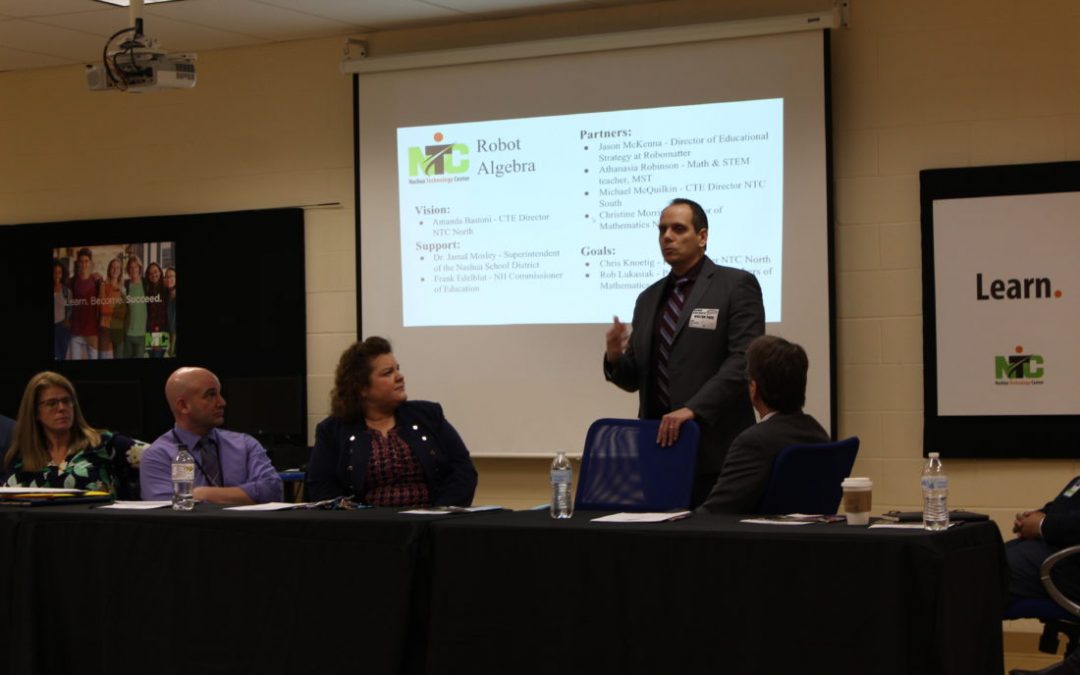
Jan 21, 2019 | Article
The state Department of Education in September awarded the Nashua Technology Center a $50,000 grant to pilot a Career Technical Education-based Algebra I course for the 2019-20 academic term, with the help of various representatives through research and feasibility testing.
For Edelblut, awarding the grant was an easy decision: he was eager, he said, to find people as interested as he is in creating a hands-on approach for students to learn math. full article











